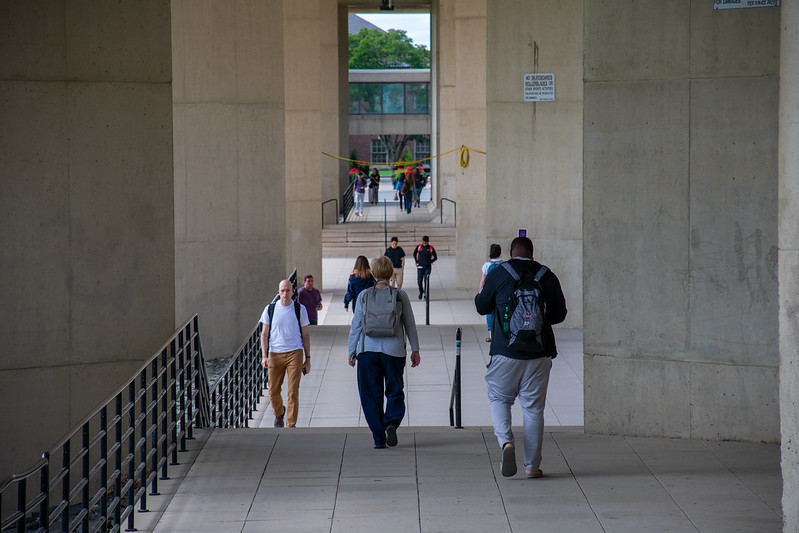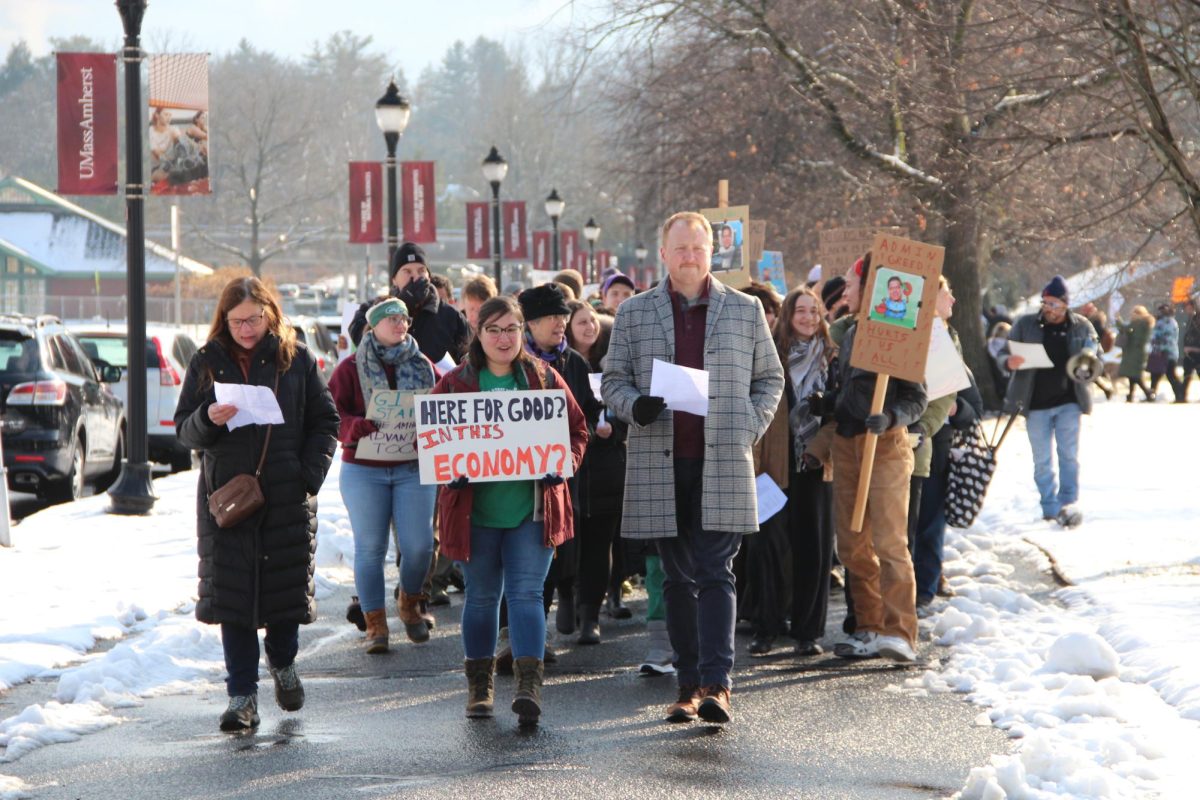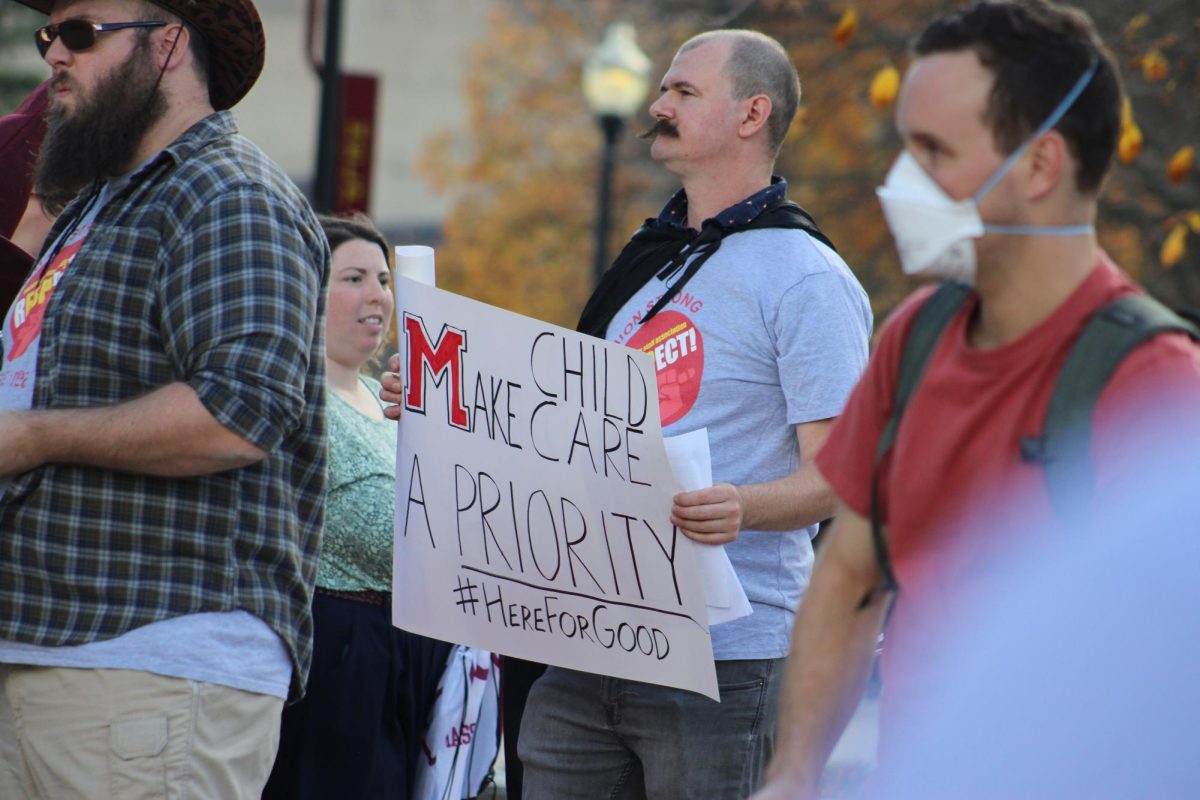The University of Massachusetts has determined its fall semester plan, which will allow any students with campus housing reservations to return to live on campus, the school announced in a Monday afternoon email to students.
A 20-page document included in the email noted that despite the options regarding housing, a “majority of the fall 2020 curriculum will be fully remote, with only essential labs, studios, performance and hands-on courses offered in-person and focused on the upper-level curriculum to provide seniors with timely progress toward degree completion.”
“Some students who live on campus may have a fully remote curriculum, a factor they should consider in their decision whether to come to campus,” the school said.
In a message included at the beginning of the document, Chancellor Kumble Subbaswamy wrote that “We certainly understand that not all students will want to live or spend time on campus under such conditions, and no students will be required to do so. We strongly encourage all those who are at high risk for COVID-19 to not come to campus, unless they regard the risk on campus to be less than the alternative.”
Monday’s announcement is the latest development in UMass’ long-term planning process for the upcoming academic year. The school community has had its focus trained on the end of this month, the deadline Subbaswamy set for determining the course that UMass will plot for the fall semester.
The school will ask students to sign “The UMass Agreement,” which will describe the safety and health protocols that they will be expected to adhere to this fall.
“Protocols for students include strict physical distancing, wearing face coverings outside personal living spaces, limiting social contacts to a minimal number of people per day, the prohibition of guests in residence halls, subjecting themselves to virus testing on demand, daily self-monitoring and reporting, assisting with contact tracing, and limiting travel away from the immediate campus area for work and/or emergencies only,” the announcement read.
“We’re trying to create as much of a cocoon around the campus as possible,” Subbaswamy said in a Monday morning interview with the Massachusetts Daily Collegian. “The idea is that the ultimate goal is to try to create as much of a closed environment here as we can and try to maintain that health throughout the period of time that students will be on campus.”
Testing and Tracing
The University will use several strategies to test the community and monitor possible spreads of the virus.
“All students accessing campus will be tested before moving into housing or participating in any university programming,” the document sent Monday afternoon read.
Additionally, students living both on and off campus will be asked to closely monitor their symptoms and report them daily to the school via the My UMass cellphone app or another to-be-named application.
“I want to be very clear that testing is really only one tool in the toolbox,” Subbaswamy told the Collegian. He stressed that individual habits, such as limiting contact and proper sanitation, will be vital in preventing the spread of illness on campus.
Should a member of the campus community show symptoms, a “testing, isolation and contact tracing protocol” will be used by the school to slow the spread of the virus, the plan read.
“Symptomatic testing will be handled by University Health Services and they have a certain capacity already in hand, adequate for testing those with symptoms. So, we’re confident that that’s covered,” Subbaswamy told the Collegian.
The school is pursuing tests developed by the Massachusetts Institute of Technology’s Broad Institute, which will be provided to schools and colleges in the state. UMass is also planning to create its own testing apparatus through the school’s Institute for Applied Life Sciences.
Possibly infected people will be relocated to alternate housing in specific dorms or the UMass Hotel, said Jeffrey Hescock, the school’s executive director of environmental health and safety. But Hescock added that the specifics of quarantine locations are still being developed.
Hescock also described an example scenario of how the process will work if students show symptoms. If a group of students in Kennedy Hall, for example, report symptoms of the virus, then the school can focus on that particular location for testing, Hescock said. Some students may then be moved to a quarantined living area if they test positive for the virus or came into contact with others who did.
In the case that the virus spreads beyond what can safely be managed, the school may make adjustments or potentially close campus.
“If in spite of our best efforts, if the spread is uncontrollable in the sense that it begins to become a high percentage of our population, we’re going to have to shut down the campus,” Subbaswamy said.
On-Campus Housing
After July 1, the school will communicate with students regarding their housing arrangements and eligibility to live on campus. Students will have the option to cancel their on-campus housing reservation.
“Residential Life is working to accommodate as many students as possible in the room selection process. It has surveyed students about their willingness to live with a roommate and will make every effort to create as many doubles as our occupancy guidelines allow,” the document read.
It went on to say that “Students who opt not to come to campus for fall 2020 will not be charged for room and board, which accounts for nearly half of the total cost for a full-time, in-state residential student.”
The move-in process for students living in dorms will be extended to take place over multiple days.
Two family members will be allowed assist with move-in and all participants will be required to wear masks and gloves. Students are also asked to pack for a 12-week stay, rather than the full year, and to pack less in general.
Cleanings of residence hall bathrooms will be more frequent and approved occupancy numbers for the rooms will be posted, the school said. Pedestrian flows inside buildings will also be altered to minimize contact, with the school employing one-way paths on stairs, walkways and in lounges. Occupancy limits will also extend to elevators.
Off-Campus Housing
The University has thousands of students who live off-, in- and around campus.
Many students have leases planned for September, to which the University responded, “Given the early start date for the fall semester, if a student’s lease does not begin until September 1, 2020 the student should contact their faculty about missing face-to-face classes for the first two weeks to make needed academic accommodations,” according to the proposal.
When asked if off-campus students would be held accountable for breaking the previously described “cocoon,” Vice Chancellor for Student Affairs and Campus Life Brandi Hephner LaBanc said, “all of this comes back to inviting folks to be responsible members of our community and helping us all reduce the spread… leaving the area and coming back creates a risk and we want to reduce that as much as possible.”
Additionally, guidelines may be set for off campus students.
Finances
Tuition will not change for both in-state and out-of-state students during the academic year. There is a tuition freeze for in-state tuition, however.
“The University of Massachusetts Amherst is a high quality institution, you’ve seen its trajectory over the last 10 years and so on. We want to maintain that trajectory and quality for when the pandemic is over and not weaken the institution, and so hanging on to all the faculty and all the advising staff and the resource centers and all the resources we have is cleared up. And so you know that, as I said, the cost doesn’t go down,” the chancellor said. “In fact, the overall cost for running the University goes up, not down.”
Subbaswamy also addressed how he knows many people are facing financial difficulties due to the pandemic. The chancellor said the University is working to help students with financial aid.
“The tuition is dependent on the cost of offering the education overall. UMass is using the same faculty, unlike, say, the University of Phoenix online system,” Subbaswamy said.
“Remote learning or online learning gets a bad rap sometimes. It can really be a quality experience and, you know, and the faculty really put the time and effort into the delivery of the courses and the students are prepared as well on their end,” said Senior Vice Provost and Dean of Undergraduate Education Carol Barr.
Barr continued, “The faculty have committed to do the work over this summer to make a quality educational experience for the students, knowing that, you know, no one chose to have remote courses on the books for a residential university like a UMass Amherst, but it is what it is. And everybody is really rising to the occasion and really wants to work hard… We want students to progress to a degree completion and [we’re] willing to put in the time and effort in order to make that happen.”
For the fiscal year that is concluding on June 30, several factors helped to act as a “cushion” to prevent layoffs as a result of the coronavirus. Subbaswamy explained that UMass started off the previous academic year “extremely strong” with 700 more students coming to UMass than originally expected. The cushion helped to counteract the $50 million deficit and Subbaswamy said that the University received $9 million from the CARES Act federal stimulus bill.
Subbaswamy added that all senior administrators agreed to take a pay reduction and that staff had agreed to a one-week furlough voluntarily rather than see layoffs for some of their colleagues.
“So the combination of all of that, we were able to balance the budget, but going into the next fiscal it’s not going to be that easy.”
The future budget is dependent on a variety of factors including how many students actually come back to campus, if any further CARES Act funding comes to Massachusetts or the University, and whether the state’s revenue is down, which would cut into UMass’ appropriations. All these factors currently remain unclear, according to Subbaswamy.
Despite being in the early stages, Subbaswamy said, “I would be very surprised if we were able to balance the budget in the next fiscal without some layoffs,” adding that for furloughs, voluntarily put forward by unions, “I suspect that discovering the magnitude of what we’re facing, at this stage, you know, we can’t rule it out.”
Academics
With more time to plan, the University hopes to create an engaging academic experience for students.
“The March sudden pivot to remote learning was difficult for a lot of people, faculty and students alike. No one was planning to do that and that sudden shift certainly impacted a lot of folks,” said Barr.
Through teaching and learning plans, “faculty can connect in a more intentional way with students on the student engagement, whether that’s synchronous activity or asynchronous activity, different things that they can do,” Barr said. “Absolutely the student experience is first and foremost on our minds with remote learning and the number of remote classes that we will have in place in the fall.”
Details about whether specific courses will be offered remotely or face-to-face will be found on SPIRE.
The plan also notes that “Disability Services will work with students to put accommodations in place before and during the first few weeks of the semester.” The school is encouraging students to register with Disability Services on SPIRE between July 1 and August 1.
Student Life
The fall semester will look very different in regards to student life.
In a preliminary proposal released three weeks ago, Subbasamy said, “Students who choose to attend UMass Amherst do so not only for the quality of the faculty and the academic programs, but also for the immersive experience, which offers opportunities for enrichment that can be undertaken with a diverse group of peers. As best we can – and there are severe limitations in the midst of the COVID-19 pandemic – we will strive to sustain the community connections that represent UMass at its best.”
UMass Dining will see changes and will adapt to state and federal guidelines for food service.
“It will offer new grab-and-go stations, online ordering for many of its retail locations and tents for outdoor dining on campus,” the plan said.
Monday’s announcement also established that “Cultural Centers and affinity spaces, including the Stonewall Center, Veterans Resource Center, Office of Religious and Spiritual Life, and Men and Masculinities Center, will be open in accordance with public health guidelines for social distancing. All Advocacy, Inclusion, and Support programs will continue to provide programs and services through a mix of in-person and virtual formats.”
The Recreation Center will also be open and operate in accordance with public health guidelines. “Safety measures will include capacity restrictions; elimination of activities that require physical person-to-person contact or touching the same equipment without sanitizing (e.g., pick-up basketball); limits to pool usage; and restriction of locker room use,” the proposal read.
Ultimately, all RSO programming will look different, including Greek Life, which the announcement addressed: “Greek Life recruitment will be conducted. Most, if not all, chapter programming will be held remotely.”
Additionally, the plan noted that “It is unlikely that Club Sport teams will travel in the fall.”
The status of student run businesses is still being evaluated by the school.
The University also plans to allow for protests, which have continued nationwide since the murder of George Floyd.
“All First Amendment rights will be supported by the university with an emphasis on working with student organizers to educate, strategize, and execute COVID-19 safety protocols to mitigate spread of the virus,” the proposal read.
“It’s important that students have the opportunity to voice perspectives and to be in unity about these things, but do that in a safe way,” Hephner LaBanc said.
In reference to possible cases of students not following physical distance guidelines, Hephner LaBanc stated, “Our goal is not to refer students immediately to the Dean of Students Office and have a heavy hand.”
She said that some behaviors may need referral if necessary and that the University will be working with an “escalation of intervention” strategy, one that remains considerate of the new adaptations to life and social gatherings students must adjust to.
“We also need to take this very seriously, and we need students to take this very seriously on campus,” Hephner LaBanc said.
Will Katcher can be reached at [email protected]; Cassie McGrath can be reached at [email protected]; Chris McLaughlin can be reached at [email protected].






















